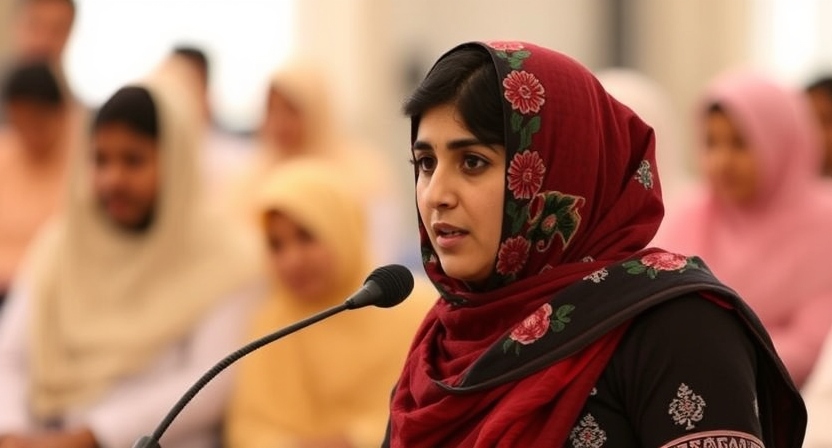Taliban Skips Muslim Girls’ Education Summit in Pakistan: Malala Stands Strong 2025
| Section | Headings and Subheadings |
|---|---|
| Introduction | – Brief Overview of the Summit and Key Players |
| – Why This Summit Matters in 2025 | |
| The Summit in Pakistan | – Purpose of the Muslim Girls’ Education Summit |
| – Key Attendees and Stakeholders | |
| Taliban’s Decision | – Taliban’s Stance on Girls’ Education |
| – Reasons for Skipping the Summit | |
| – Global Reactions to the Boycott | |
| Malala Yousafzai’s Role | – Malala: A Beacon of Hope for Education |
| – Key Highlights of Malala’s Speech | |
| – The Impact of Her Advocacy | |
| Global Context | – The Current State of Girls’ Education in Afghanistan |
| – International Efforts to Address Educational Disparities | |
| The Importance of Education | – Education as a Tool for Empowerment |
| – Cultural and Political Barriers | |
| What’s Next? | – Policy Recommendations for Pakistan and Afghanistan |
| – Global Cooperation and Roadmaps | |
| Conclusion | – Reflection on the Summit’s Impact |
| – A Hopeful Vision for the Future | |
| FAQs | – 5 Unique Questions with Concise, Informative Answers |
Table 2: Article
# Taliban Skips Muslim Girls’ Education Summit in Pakistan: Malala Stands Strong in 2025
## Introduction
The world held its breath as Pakistan hosted the Muslim Girls’ Education Summit in 2025—a landmark event aimed at championing education for millions of marginalized girls. With global icons like Malala Yousafzai gracing the stage, the summit aimed to pave the way for a brighter, inclusive future. However, the Afghan Taliban’s glaring absence raised eyebrows and fueled debates. Why did the Taliban skip such a critical event? And what does this mean for the fight for education? Let’s dive in.
## The Summit in Pakistan
### Purpose of the Muslim Girls’ Education Summit
This summit wasn’t just another event; it was a clarion call for change. With education rates among Muslim girls alarmingly low, especially in conflict-ridden regions, the summit aimed to unite leaders, activists, and educators to discuss actionable strategies.
### Key Attendees and Stakeholders
The summit drew an impressive crowd, including policymakers, educators, and activists from across the globe. The highlight? Nobel Laureate Malala Yousafzai, whose unyielding passion for girls’ education stole the spotlight.
## Taliban’s Decision
### Taliban’s Stance on Girls’ Education
Since regaining control of Afghanistan in 2021, the Taliban’s policies on education—particularly for girls—have sparked international outrage. Despite assurances of reform, restrictions have only tightened, making their absence from this summit even more glaring.
### Reasons for Skipping the Summit
The Taliban cited “ideological differences” and “foreign interference” as reasons for boycotting the summit. Critics, however, argue that this decision underscores their reluctance to engage in meaningful dialogue about girls’ education.
### Global Reactions to the Boycott
From human rights organizations to political leaders, the Taliban’s snub drew widespread criticism. Many saw it as a missed opportunity to bridge gaps and foster change.
## Malala Yousafzai’s Role
### Malala: A Beacon of Hope for Education
If anyone epitomizes resilience in the face of adversity, it’s Malala. Having survived a Taliban attack as a teenager, she continues to champion education as a fundamental right.
### Key Highlights of Malala’s Speech
Malala’s speech at the summit was nothing short of inspiring. “Education is not just a privilege; it’s a right,” she declared, urging world leaders to act decisively.
### The Impact of Her Advocacy
Malala’s presence alone brought renewed global attention to the plight of girls in Afghanistan and beyond, amplifying calls for change.
## Global Context
### The Current State of Girls’ Education in Afghanistan
Education for Afghan girls remains a distant dream, with many schools shut and resources dwindling. The Taliban’s policies have only deepened the crisis.
### International Efforts to Address Educational Disparities
Despite the challenges, organizations like UNICEF and UNESCO are working tirelessly to promote education in conflict zones.
## The Importance of Education
### Education as a Tool for Empowerment
Education isn’t just about academics; it’s a gateway to empowerment, self-reliance, and societal progress.

Cultural and Political Barriers
Overcoming deeply entrenched cultural norms and political roadblocks remains a herculean task.
## What’s Next?
### Policy Recommendations for Pakistan and Afghanistan
From investing in infrastructure to fostering inclusive policies, there’s much that governments can do to ensure every girl gets a chance to learn.
### Global Cooperation and Roadmaps
Collaboration is key. International organizations, NGOs, and governments must unite to address the educational crisis head-on.
## Conclusion
The Muslim Girls’ Education Summit was a powerful reminder of what’s at stake: the future of millions of girls. While the Taliban’s absence was disheartening, the voices of advocates like Malala remind us that change is possible. Together, we can build a world where every child, regardless of gender, has the right to dream, learn, and succeed.

FAQs
1. Why did the Taliban skip the summit?
The Taliban claimed ideological differences and foreign interference as reasons, though critics see it as reluctance to address girls’ education.
2. What was the goal of the Muslim Girls’ Education Summit?
The summit aimed to promote actionable strategies for improving education access for Muslim girls, especially in conflict zones.
3. How has Malala Yousafzai contributed to this cause?
Malala’s advocacy has brought global attention to educational disparities, inspiring policymakers and activists worldwide.
4. What’s the current state of girls’ education in Afghanistan?
The situation remains dire, with many schools closed and access severely restricted due to Taliban policies.
5. What steps can be taken to improve education for girls?
Investing in infrastructure, fostering inclusive policies, and encouraging global collaboration are vital steps toward change.